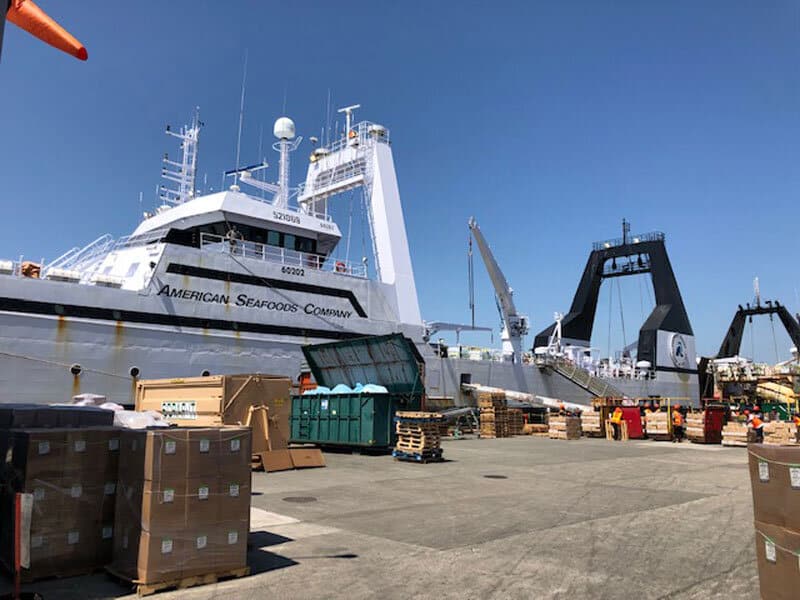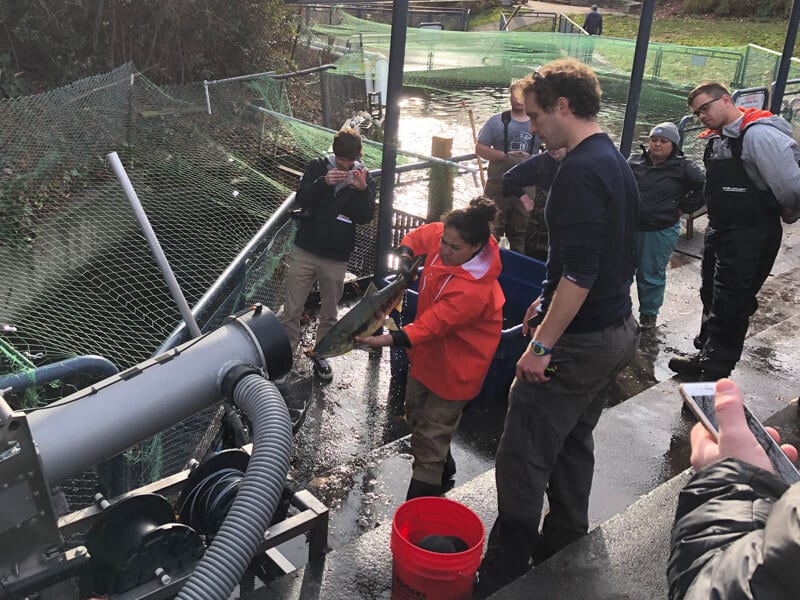National Heritage Areas are based on partnerships: bringing together a range of Tribes, organizations, businesses, and governments around heritage resources and stories. One of our partners is the Working Waterfront Coalition of Whatcom County. If you are interested in becoming a partner, learn more on our become a partner page.
Dan Tucker and the Working Waterfront Coalition

Dan Tucker wears many hats as the program manager for the Working Waterfront Coalition (WWC) of Whatcom County. He is the only staff member for the Coalition, which is a statewide advocate for waterfronts and the people who make them work. Between advocating with decision makers, supporting marine trades professionals, and providing workforce benefits to members of the Coalition, Dan keeps busy.
With background in multimedia and graphic design, Dan might not sound on paper like the type to juggle port commissions, community advocacy, and business interests within working waterfronts. However, after he worked his way up from scrubbing decks on tall ships after college to serving as a licensed officer on cruise ships, Dan found himself uniquely positioned to help guide the WWC into helping others onto a similar path.
“I just remember reading crew bios and thinking, ‘some poor schmuck gets paid to do that really cool thing that I’ve only seen in movies,'” Dan says.
Waterfront Advocacy
One of the ways the WWC advocates for the future of waterfronts is through a marine trades apprenticeship program. As someone who worked in maritime industries for most of his career, Dan is well-aware of the difficulties that maritime companies face with hiring and retention. The WWC’s apprenticeship program is a step on the path to rejuvenating the livelihoods of waterfront workers. A four-year program that provides participants with full-time job in the industry and ends with a journeyman’s level certificate is an appealing alternative to a college degree for many.
Participants in the apprenticeship program “can put [the certificate] on their resume and they can jumpstart their career, wherever they go next, or they can continue to grow — sometimes with the companies that have been hosting them for the last 4 years,” said Dan. The WWC also offers scholarships to employers to make the apprenticeships more feasible.

It’s not just young people who are taking part in the program either, according to Dan. “You get a lot of people that are in their 30s and their 40s, even in their 50s that are finding themselves needing to start over somewhere else. So it’s highly imperative that we have programs like this that are accessible to those people as well.
Another way the WWC serves maritime workers is by providing a health trust benefits program specifically designed for maritime businesses. “It’s grown over the last year. We more than doubled our participation,” said Dan. Making it easier for businesses to give their employees benefits helps them to retain high quality employees.
Of course, without the support of the community, Dan’s work might not be as impactful. Beyond their daily work with current waterfront advocates—including the Port of Bellingham, existing maritime businesses, and local Tribes—the WWC is also fighting to make working waterfronts more accessible to everyone. To achieve that goal, they are advocating for interpretive signage that explains more visible parts of maritime work, like cranes and long-term businesses. “When people are looking around and saying, ‘what’s that?’ Well, we can tell you about it and how it’s important to the businesses and the economy regionally… because a lot of people are losing sight of that,” said Dan.
Community and Businesses

However, their community advocacy goes beyond just signage. Dan co-hosts the “Love Your Waterfront” podcast on 88.3 KMRE, a local Whatcom County radio station. The show “explores all of the hustle and bustle of Whatcom’s working waterfront,” and, while it’s currently just 30 minutes a month, Dan is hoping to expand to an hour and share it online to tell more waterfront stories.
He’s also found surprising success in print publications. The WWC’s tri-annual publication “On the Waterfront” taught the Coalition that it’s important to meet their audience where they are. For the WWC, that isn’t necessarily online. Efforts like hosting a physical job board at the Port of Bellingham and producing printed informational brochures about opportunities onboard vessels have been much more successful for the WWC’s audience than conventional approaches like posting jobs online.
As a partner of the Maritime Washington National Heritage Area, WWC shares our goal of sharing maritime stories. “I feel like when people have an appreciation, particularly of the landscape itself, the earth itself, they start to understand how important that is to the businesses along the waterfront that need that access,” Dan explains.
“I really try to clarify… none of the businesses along this waterfront aim to harm it in any way, because everyone here recognizes, especially those that are operating on it, that if it gets dirty, if it gets polluted or contaminated, nobody gets to use it and that hurts everyone,” said Dan. “That all ties back to the mission that we’re trying to accomplish, which is to create a waterfront that is vibrant and works for everyone.”

